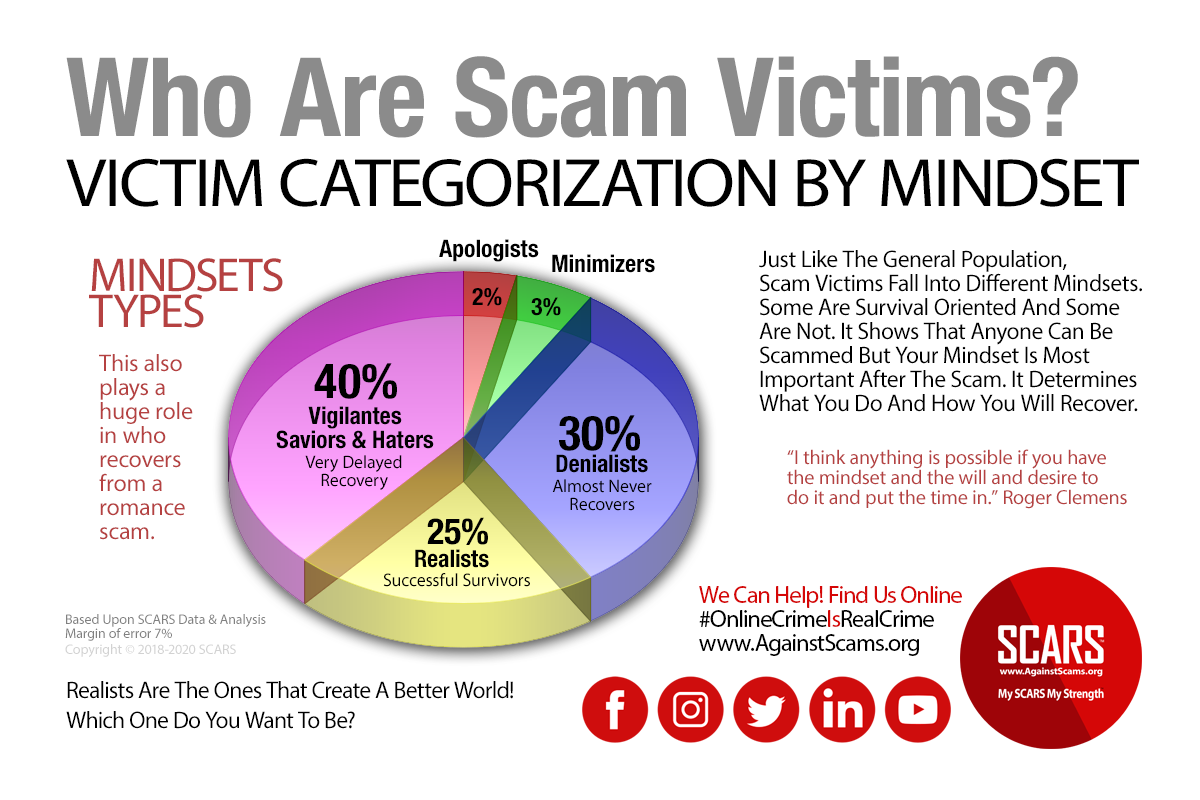
SCARS Institute’s Encyclopedia of Scams™ Published Continuously for 25 Years

What Do Victims Believe?
What Are Their Mindsets?
As the result of a year-long victimization study by the Society of Citizens Against Romance Scams Inc. [SCARS] – SCARS has been able to identify the primary Scam Victim Mindset Profiles and how they relate to the victim’s response after the scam.
A total of 16,000 victims were sampled in this analysis over 2017 and 2018 by the SCARS Analytics Department.
STUDY RESULTS:
VICTIM TAXONOMY / CATEGORIZATION – MINDSET TYPES:
- African Apologists
- Minimizers
- Vigilantes
- Denialists
- Realists
AFRICAN APOLOGISTS
African Apologists tend to be those that politically believe that the Africans (the Scammers) are just yet another set of victims of “White Privilege” and “Colonialization.” These victims refuse to blame criminal behavior for the scammer’s actions or that this was a choice made by individuals to scam. Instead, it is fundamentally Western Society’s fault for how we treated Africans in the historic past and present. You will find them being very liberal in their political orientation which colors their view that victims live in countries which are really at fault and the underlying cause of African criminality is not the political and social corruption of the African Nations. In other words, it is the victim’s country at fault, and no one should be surprised or shocked by Africa poor people finding a living in whatever way they can. While their numbers are few they are highly vocal in their blame against all governmental and support institutions as being a part of the problem.
MINIMIZERS
Minimizers are those that were minimally affected financially or not at all and tend to believe that scams and their impact on victims is overblown. These tend to be the ones that act and comment negatively against other victims, and have little ability to empathize with scam victims. These tend to be negative judgmentally, and while small as a group tend to project shame onto victims – especially those in the Denialist category. However, there is a difference between their condemnation and the provocation used by supporters of victims. Supporters may ask “What Were You Thinking” as a means of getting the discussion started, but Minimizers ask that as a way of pointing out how “stupid” the victim is – questioning the victim’s self-worth vs. questioning the act.
VIGILANTES
Vigilantes are those victims that are profoundly and adversely affected by the aftermath of the scam. It affects them in a way that forces their fear and anger to dominate. Their initial lack of control and sense of powerlessness triggers the need for retaliation and vengeance, frequently directly towards other victims and victims’ assistance providers (such as police and victims assistance organizations), not just the criminals that harmed them. Their actions tend to be performed online without any real commitment, acting to be disruptive and counter-productive to real solutions. It is all “Their Way or No Way,” and everyone is with them or against them. Vigilantism is also a significant cause of delay in these victims recovering, as it perpetuates the anger or rage and frequently turning it into a destructive hate. It is nearly impossible to assist these victims as they are suspicious of anyone offering help, and tend to aggregate into like-minded groups online. There is no evidence that any vigilante has resulted in a single arrest or reduction in online crimes. In fact, there is substantial evidence that Vigilantes work against their best interest by alienating those entities that are best equipped to help them and society as a whole. Most Vigilantes refuse to report the crimes since (in their view) “no one does anything anyway” – only they can save the world. They tend to view themselves as the only true “Anti-scammers” and their approach is the only correct one.
DENIALISTS
Denialists are those victims that have great difficulty accepting that they were scammed. They lock away the experience and attempt to go forward without ever fully recognizing or recovering from it. In every event in life, it is important to recognize the reality of what occurred and what could or could not have been done to mitigate it – this is how we learn from our experiences. In the case of scams, victims are heavily manipulated but were not completely powerless. It is important to recognize their role in what occurred – not to blame them but in preventing future occurrence. It does not mean the victim was totally at fault, just that the victim failed to recognize critical red-flags and was manipulated against their own best interests. Denialists cannot accept that they were scammed (manipulated), and refuse to acknowledge it to themselves, their circle of connections, as well as refuse assistance. This prevents them from learning from the experience and frequently results in additional scams. To accept assistance would force them to recognize what occurred and deal with it. They also refuse to report these crimes as this forces the recognition of what occurred. The result is a very significant extension of the traumatic experience and far less likelihood of full recovery.
REALISTS
Realists tend to be far better balanced politically and intellectually. They have a better ability to analyze what occurred to them, understand their role and the role of the criminal, and place the proper blame for the criminal actions on the scammer. They understand that scams are performed by criminals, not idiots. They view the scammers as dedicated thieves with far less mythologizing and as a result recover far more easily. These are also the individuals that recognize opportunities for real actions that will result in change and positive advocacy, instead of simple vigilantism. They tend to seek out viable support and assistance for themselves and others. They are also the ones best equipped to help mentor and guide other victims to positive outcomes as volunteers. While not all of them report scams to proper authorities, they do report them in vastly higher numbers than any other group.
STUDY BREAKDOWN:
- 4% – African Apologists
- 6% – Minimizers
- 42% – Vigilantes
- 35% – Denialists
- 23% – Realists
SUMMARY:
Just Like The General Population, Victims Fall Into Different Mindsets. Some Are Survival Oriented And Some Are Not.
It Shows That Anyone Can Be Scammed But Your Mindset Is Most Important After The Scam. It Determines What You Do And How You Will Recover.
– – – – – – – – – – – – – – –
Copyright © 2018 Society of Citizens Against Romance Scams Inc. [SCARS] – All Rights Reserved Worldwide & Webwide – RSN/Romance Scams Now & SCARS/Society of Citizens Against Romance Scams are all trademarks of Society of Citizens Against Romance Scams Inc.
-/ 30 /-
What do you think about this?
Please share your thoughts in a comment below!
LEAVE A COMMENT?
Thank you for your comment. You may receive an email to follow up. We never share your data with marketers.
Recent Comments
On Other Articles
- on Love Bombing And How Romance Scam Victims Are Forced To Feel: “I was love bombed to the point that I would do just about anything for the scammer(s). I was told…” Feb 11, 14:24
- on Dani Daniels (Kira Lee Orsag): Another Scammer’s Favorite: “You provide a valuable service! I wish more people knew about it!” Feb 10, 15:05
- on Danielle Delaunay/Danielle Genevieve – Stolen Identity/Stolen Photos – Impersonation Victim UPDATED 2024: “We highly recommend that you simply turn away form the scam and scammers, and focus on the development of a…” Feb 4, 19:47
- on The Art Of Deception: The Fundamental Principals Of Successful Deceptions – 2024: “I experienced many of the deceptive tactics that romance scammers use. I was told various stories of hardship and why…” Feb 4, 15:27
- on Danielle Delaunay/Danielle Genevieve – Stolen Identity/Stolen Photos – Impersonation Victim UPDATED 2024: “Yes, I’m in that exact situation also. “Danielle” has seriously scammed me for 3 years now. “She” (he) doesn’t know…” Feb 4, 14:58
- on An Essay on Justice and Money Recovery – 2026: “you are so right I accidentally clicked on online justice I signed an agreement for 12k upfront but cd only…” Feb 3, 08:16
- on The SCARS Institute Top 50 Celebrity Impersonation Scams – 2025: “Quora has had visits from scammers pretending to be Keanu Reeves and Paul McCartney in 2025 and 2026.” Jan 27, 17:45
- on Scam Victims Should Limit Their Exposure To Scam News & Scammer Photos: “I used to look at scammers photos all the time; however, I don’t feel the need to do it anymore.…” Jan 26, 23:19
- on After A Scam, No One Can Tell You How You Will React: “This article was very informative, my scams happened 5 years ago; however, l do remember several of those emotions and/or…” Jan 23, 17:17
- on Situational Awareness and How Trauma Makes Scam Victims Less Safe – 2024: “I need to be more observant and I am practicing situational awareness. I’m saving this article to remind me of…” Jan 21, 22:55
ARTICLE META
Important Information for New Scam Victims
- Please visit www.ScamVictimsSupport.org – a SCARS Website for New Scam Victims & Sextortion Victims
- Enroll in FREE SCARS Scam Survivor’s School now at www.SCARSeducation.org
- Please visit www.ScamPsychology.org – to more fully understand the psychological concepts involved in scams and scam victim recovery
If you are looking for local trauma counselors please visit counseling.AgainstScams.org or join SCARS for our counseling/therapy benefit: membership.AgainstScams.org
If you need to speak with someone now, you can dial 988 or find phone numbers for crisis hotlines all around the world here: www.opencounseling.com/suicide-hotlines
A Note About Labeling!
We often use the term ‘scam victim’ in our articles, but this is a convenience to help those searching for information in search engines like Google. It is just a convenience and has no deeper meaning. If you have come through such an experience, YOU are a Survivor! It was not your fault. You are not alone! Axios!
A Question of Trust
At the SCARS Institute, we invite you to do your own research on the topics we speak about and publish, Our team investigates the subject being discussed, especially when it comes to understanding the scam victims-survivors experience. You can do Google searches but in many cases, you will have to wade through scientific papers and studies. However, remember that biases and perspectives matter and influence the outcome. Regardless, we encourage you to explore these topics as thoroughly as you can for your own awareness.
Statement About Victim Blaming
SCARS Institute articles examine different aspects of the scam victim experience, as well as those who may have been secondary victims. This work focuses on understanding victimization through the science of victimology, including common psychological and behavioral responses. The purpose is to help victims and survivors understand why these crimes occurred, reduce shame and self-blame, strengthen recovery programs and victim opportunities, and lower the risk of future victimization.
At times, these discussions may sound uncomfortable, overwhelming, or may be mistaken for blame. They are not. Scam victims are never blamed. Our goal is to explain the mechanisms of deception and the human responses that scammers exploit, and the processes that occur after the scam ends, so victims can better understand what happened to them and why it felt convincing at the time, and what the path looks like going forward.
Articles that address the psychology, neurology, physiology, and other characteristics of scams and the victim experience recognize that all people share cognitive and emotional traits that can be manipulated under the right conditions. These characteristics are not flaws. They are normal human functions that criminals deliberately exploit. Victims typically have little awareness of these mechanisms while a scam is unfolding and a very limited ability to control them. Awareness often comes only after the harm has occurred.
By explaining these processes, these articles help victims make sense of their experiences, understand common post-scam reactions, and identify ways to protect themselves moving forward. This knowledge supports recovery by replacing confusion and self-blame with clarity, context, and self-compassion.
Additional educational material on these topics is available at ScamPsychology.org – ScamsNOW.com and other SCARS Institute websites.
Psychology Disclaimer:
All articles about psychology and the human brain on this website are for information & education only
The information provided in this article is intended for educational and self-help purposes only and should not be construed as a substitute for professional therapy or counseling.
While any self-help techniques outlined herein may be beneficial for scam victims seeking to recover from their experience and move towards recovery, it is important to consult with a qualified mental health professional before initiating any course of action. Each individual’s experience and needs are unique, and what works for one person may not be suitable for another.
Additionally, any approach may not be appropriate for individuals with certain pre-existing mental health conditions or trauma histories. It is advisable to seek guidance from a licensed therapist or counselor who can provide personalized support, guidance, and treatment tailored to your specific needs.
If you are experiencing significant distress or emotional difficulties related to a scam or other traumatic event, please consult your doctor or mental health provider for appropriate care and support.
Also read our SCARS Institute Statement about Professional Care for Scam Victims – click here to go to our ScamsNOW.com website.

















Ill sqy that you believe your inlove! Then you realixe that tje man on the other side dont give a shit and will say anything to keep the cash flowing hut if anyone has bad bad. Luck go worse and never ges beter to the point where your giving moneytrouble the time ! No end in sight you gotta run bud friends these women will take your kids savings and not bat there fake eyelashes ! NEVER SEND NO ONE NOT EVEN IF YOU START THINKING WITH THE WRONG HEAD YOUR MONEY WILL DISSAPEAR AND YOU WILL FEEL LIKEXA FOOL BUT YOU WILL NOT WIN HER OVER ! trut me friend you will , or they will take your last dime and not care if you lose your home or car its a mess but trust me you will get taken forcall that you willl ginve ! God bless and dont do it she s not coming trust me ok im a soldier a veteran and a victim of scam ! Olease listen if you cant touch her with your hand no money should leave your hand ! Moneygram and wesrern union make their money from fools like us !
i HAVE BEEN SCAMMED BY A LADY THAT GOES BUY MANY NAMES. HER REAL FIRST NAME IS MATILDA. HER REAL LAST NAME IS ADJIE. SHE IS VERY BEAUTIFUL LADY. SHE WILL SEND YOU PICTURES OF HER WHEN SHE WAS IN HER LATE 20’S. SHE IS NOW IN HER 30’S. SHE WILL START WITH SMALL MONEY REQUEST FOR THINGS LIKE I NEED MONEY FOR INTERNET FEES. THEN IT WILL BE I NEED A PASS PORT. WITH IN A SHORT TIME SHE WILL USE A SCAM ABOUT HER LATE FATHER ERNEST ADJIE. THAT WAS KILLED IN A PLAN CRASH AND HAS LEFT HER 4.5 MILLION DOLLARS. SHE WILL TRY TO GET YOU TO SEND $9000.00 AS SHE NEED THIS MUCH MONEY TO GET HER 4.5 MILLION DOLLARS HER FATHER LEFT HER. MATILDA IS THE BEST SCAMMER IN GHANA AFRICA. SHE USESES HER BEAUTY TO DRAW YOU IN, STAY AWAY FROM THIS PERSOM I WAS TAKEN FOR OVER $2000.00